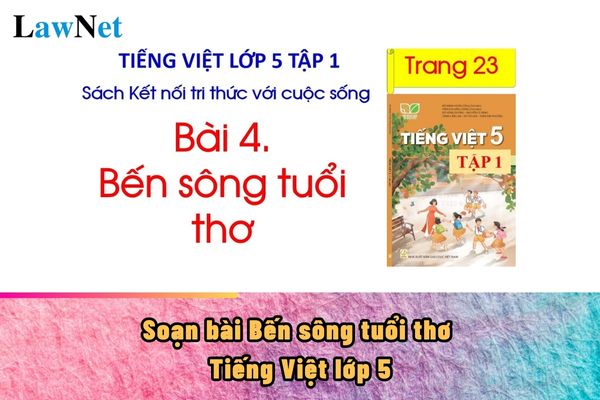Guidelines of preparing the lesson "Bến sông tuổi thơ" for grade 5 students in Vietnam
Guidelines of preparing the lesson "Bến sông tuổi thơ" for grade 5 students in Vietnam
"Bến sông tuổi thơ" is one of the texts in the Grade 5 Vietnamese subject (pages 23, 24) of "Kết nối tri thức" curriculum.
Below is a detailed guide on how to prepare the lesson "Bến sông tuổi thơ" for Grade 5 Vietnamese subject:
|
Preparing the Lesson "Bến sông tuổi thơ" * Main content and content of each section |
*Note: The content of Preparing the lesson "Bến sông tuổi thơ" for Grade 5 Vietnamese is for reference only./.

Guidelines of preparing the lesson "Bến sông tuổi thơ" for grade 5 students in Vietnam (Image from the Internet)
What are the characteristics of the Grade 5 Vietnamese subject?
According to Section I, Appendix of the General Education Program for the Vietnamese Language subject issued together with Circular 32/2018/TT-BGDDT, the teaching of the Grade 5 Vietnamese subject has the following characteristics:
Vietnamese is a language and literature education subject, taught from Grade 1 to Grade 12. In primary school, this subject is called Vietnamese; in middle school and high school, it is called Literature.
Literature is a subject that embodies both instrumentality and aesthetic-humanitarianism; it provides students with communication tools and forms a foundation for learning all other subjects and educational activities in school; it is also an important tool for educating students about the noble values of culture, literature, and the national language; it fosters healthy emotions, humanizing feelings, and compassionate living.
Through verbal texts and vivid artistic images in literary works, using activities like reading, writing, speaking, and listening, the Literature subject plays a major role in helping students form and develop beautiful qualities and core competencies to live and work effectively and to learn throughout life.
The content of the Literature subject is comprehensive, including cultural, ethical, philosophical knowledge,... related to many subjects and educational activities such as History, Geography, Art, Civic Education, Foreign Languages, Nature and Society, Experience Activities, Career-Oriented Activities,... The Literature subject also closely relates to life, helping students to care and connect more with daily life, to relate and have problem-solving skills for real-life issues.
The core content of the subject includes basic and essential knowledge and skills about the Vietnamese language and literature, meeting the requirements for student qualities and competencies at each educational level; it is divided into two phases: basic education and career-oriented education.
Basic education phase: The program is designed around the main strands corresponding to the skills of reading, writing, speaking, and listening. Knowledge of the Vietnamese language and literature is integrated into reading, writing, speaking, and listening teaching. Materials are selected and arranged suitable to the reception ability of students at each educational level.
The goal of this phase is to help students master the use of Vietnamese to communicate effectively in life and study all subjects and educational activities well; to form and develop literary competence, an expression of aesthetic competence; and to nurture thoughts and feelings for students to develop their soul and character.
Career-oriented education phase: The program consolidates and develops the results of the basic education phase, helping students enhance their language and literary competence, especially in receiving literary texts; it strengthens the skill of creating argumentative and informational texts with more complex content and writing techniques; it provides some historical literary and literary theory knowledge practically beneficial for reading and writing about literature; it continues to nurture thoughts, feelings, soul, and character for students to become responsible citizens.
Additionally, each year, students with a social science and humanities orientation can choose to study several specialized subjects.
These specialized subjects aim to enhance knowledge of literature and language, applying knowledge to practice, catering to students' interests, needs, and career orientation.
What are 4 perspectives in developing the grade 5 Vietnamese Language subject curriculum?
According to Section II, Appendix of the General Education Program for the Literature subject issued together with Circular 32/2018/TT-BGDDT, the development of the grade 5 Vietnamese Language subject curriculum includes:
The Literature Program follows the basic regulations stated in the overall program, while also emphasizing the following perspectives:
[1] The program is developed on a theoretical and practical basis, updating research achievements in education science, psychology, and methodologies of teaching Literature; achievements in literature and linguistics; Vietnamese literature achievements through periods; experience in developing the Literature subject curriculum in Vietnam, particularly from the early 21st century to the present, and the international trends in curriculum development in general and the Literature subject curriculum in particular in recent years, especially in developed countries; the social and educational reality, economic conditions, and Vietnamese cultural traditions, particularly the diversity of students' backgrounds in terms of regions, conditions, and learning capabilities.
[2] The program takes the training of communication skills (reading, writing, speaking, and listening) as the main axis throughout all three educational levels to meet the competency-oriented program's requirements and ensure cohesion and continuity across all grade levels.
Fundamental and foundational knowledge of the Vietnamese language and literature is formed through the teaching activities of receiving and creating texts; directly serving the requirements of training reading, writing, speaking, and listening skills.
[3] The program is designed to be open, reflected in the fact that it does not specify detailed teaching content but prescribes the required outcomes in reading, writing, speaking, and listening for each grade; specifies some basic and core knowledge about the Vietnamese language, literature, and some significant literary texts of national literature as unified mandatory content for students nationwide.
[4] The program not only meets innovation requirements but also focuses on inheriting and promoting the strengths of the existing Literature subject curricula, especially the current curriculum.
>>> DOWNLOAD the Literature subject program issued together with Circular 32/2018/TT-BGDDT.

